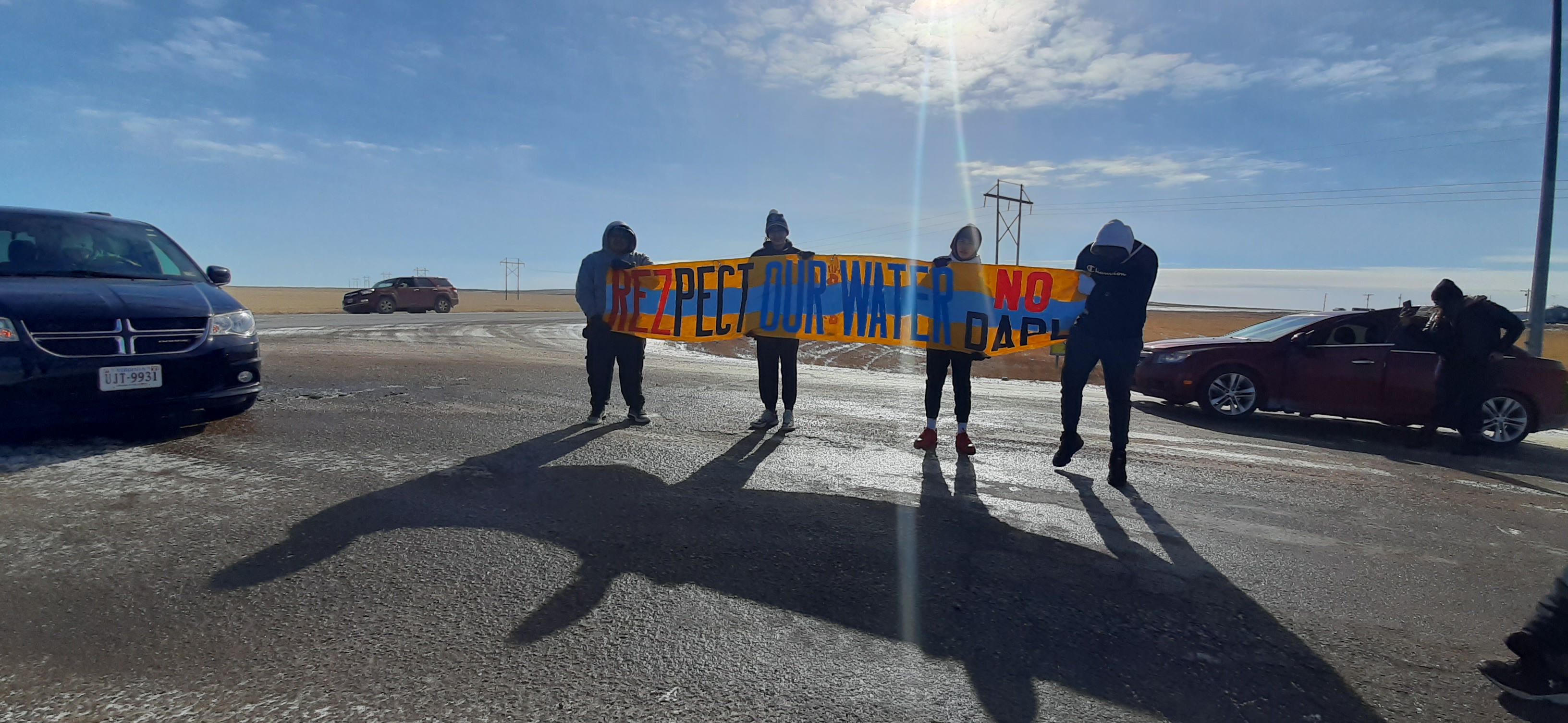
- Details
- By Darren Thompson
CANNONBALL, N.D. — On Tuesday, several dozen youth from Standing Rock and Cheyenne River ran 93 miles from Timber Lake, S.D. to Cannonball River, N.D., adjacent to the Oceti Sakowin camp location just beyond the Standing Rock Indian Reservation, in sub-zero temperature to continue to pressure President Joe Biden to end the Dakota Access Pipeline.
“The youth came up with the idea to organize a run because of President Biden’s recent decision to deny the permits for the Keystone XL Pipeline,” said Cheyenne River Grassroots Collective co-founder TaŠina Sapa Win to Native News Online. “To see youth as young as 9 years old running for clean water brought tears to my eyes and President Biden cannot simply ignore the voices of our youth to shut down the Dakota Access Pipeline.”
After the U.S. Army Corps of Engineers approved the permits for the Dakota Access Pipeline in 2016 without a comprehensive environmental review, a group of Lakota and Dakota youth organized a run from the Cannonball River in Cannonball to the district office of the United States Army Corps of Engineers in Omaha, Neb. — more than 500 miles away.
Construction on the pipeline began immediately in all four states — North Dakota, South Dakota, Iowa and Illinois — so, by the time youth runners arrived in Omaha they decided to continue their run to Washington, D.C., to stop construction of the pipeline for a more thorough environmental review.
“We ran for water just as we did more than four years ago,” said Cheyenne River Grassroots Collective co-founder Joseph White Eyes in a press release. “President Biden has the opportunity to do right by Indigenous communities and must shut down the Dakota Access Pipeline and Line 3.”
On July 6, 2020, U.S. District Judge James Boasberg ordered the Dakota Access Pipeline closed within 30 days while the U.S. Army Corps of Engineers conducts a more extensive environmental review than the original permit that allowed the transfer of oil near the Standing Rock Indian Reservation more than four years ago. The process could take more than a year.
However, on August 6, 2020, the U.S. Court of Appeals for the District of Columbia Circuit sided with pipeline owner Energy Transfer to keep the oil flowing, saying a lower court judge “did not make the findings necessary for injunctive relief.”
The pipeline holds about 5 million barrels of oil when full.
The $3.8 billion, 1,172-mile pipeline crosses beneath the Missouri River, just north of the Standing Rock Indian Reservation, where the tribe draws its water from. The Standing Rock Sioux Tribe has concerns about pollution. The company, meanwhile, maintains the line is safe.
A hearing was scheduled Thursday to determine whether or not to stop the Dakota Access Pipeline, but the U.S. Army Corps requested a two-month delay until April 9 yesterday. A
On Tuesday, the U.S. Army Corps of Engineers requested a two-month delay until April 9 to decide whether to stop the Dakota Access Pipeline. U.S. District Judge James Boasberg agreed to postpone a Feb. 10 court hearing until April 9 in a move that could give the Biden administration more time to consider how it can either end or stop the pipeline, at least temporarily, for a more stringent, court-ordered Environmental Impact Statement review. That could easily extend into 2022.
Pressure continues to pile up for President Biden and his administration to end the Dakota Access Pipeline. On Monday, Feb. 8, several celebrities and Indigenous leaders signed a letter addressing the president’s inaction to end the pipeline. Biden and Vice President Kamala Harris have yet to publicly comment on the pipeline.
Signatories of the letter included actors Scarlett Johansson, Mark Ruffalo, Robert Downey Jr., Chris Evans, Don Cheadle, Chris Hemsworth, Leonardo DiCaprio, Kerry Washington, Jane Fonda, Ryan Reynolds and Shailene Woodley, musicians Cher and Cyndi Lauper, and Green Bay Packers quarterback Aaron Rodgers.
“The U.S. Court of Appeals ruled that the pipeline is operating illegally and gave your Administration the authority to shut down the pipeline,” the letter said.
More Stories Like This
Native News Weekly (August 25, 2024): D.C. BriefsNavajo Nation Mourns the Passing of Former Vice President Rex Lee Jim
Deb Haaland Earns Endorsement From Communications Workers of America Local 7076
University Soccer Standout Leads by Example
Two Native Americans Named to Democratic Congressional Campaign Committee's“Red to Blue” Program
Help us defend tribal sovereignty.
At Native News Online, our mission is rooted in telling the stories that strengthen sovereignty and uplift Indigenous voices — not just at year’s end, but every single day.
Because of your generosity last year, we were able to keep our reporters on the ground in tribal communities, at national gatherings and in the halls of Congress — covering the issues that matter most to Indian Country: sovereignty, culture, education, health and economic opportunity.
That support sustained us through a tough year in 2025. Now, as we look to the year ahead, we need your help right now to ensure warrior journalism remains strong — reporting that defends tribal sovereignty, amplifies Native truth, and holds power accountable.
 The stakes couldn't be higher. Your support keeps Native voices heard, Native stories told and Native sovereignty defended.
The stakes couldn't be higher. Your support keeps Native voices heard, Native stories told and Native sovereignty defended.
Stand with Warrior Journalism today.
Levi Rickert (Potawatomi), Editor & Publisher
